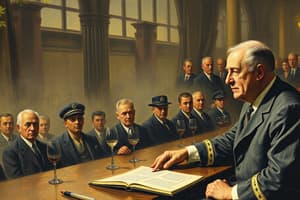Podcast
Questions and Answers
Who was the 32nd US President?
Who was the 32nd US President?
Franklin D. Roosevelt
Who was Eleanor Roosevelt?
Who was Eleanor Roosevelt?
FDR's Wife and New Deal supporter
What was the New Deal?
What was the New Deal?
A series of reforms enacted by the Franklin Roosevelt administration between 1933 and 1942
What is the Brain Trust?
What is the Brain Trust?
What are the Hundred Days?
What are the Hundred Days?
What is the Glass-Steagall Act?
What is the Glass-Steagall Act?
What was the Civilian Conservation Corps?
What was the Civilian Conservation Corps?
What was the Works Progress Administration?
What was the Works Progress Administration?
What is the Tennessee Valley Authority?
What is the Tennessee Valley Authority?
What did the National Recovery Act do?
What did the National Recovery Act do?
What is the Dust Bowl?
What is the Dust Bowl?
What was the Federal Housing Authority?
What was the Federal Housing Authority?
What is the Social Security Act?
What is the Social Security Act?
What did the Wagner Act accomplish?
What did the Wagner Act accomplish?
What was the Liberty League?
What was the Liberty League?
What was the Roosevelt Coalition?
What was the Roosevelt Coalition?
What was the Court Packing Plan?
What was the Court Packing Plan?
What is Keynesianism?
What is Keynesianism?
Who was Benito Mussolini?
Who was Benito Mussolini?
Who was Adolf Hitler?
Who was Adolf Hitler?
Flashcards are hidden until you start studying
Study Notes
Franklin D. Roosevelt
- Served as the 32nd President of the United States, implementing New Deal programs to combat the Great Depression.
- Led the nation through the majority of World War II.
Eleanor Roosevelt
- Strong advocate for civil rights, opposing Jim Crow laws and supporting women's labor conditions and birth control initiatives.
- Actively involved in New Deal reforms as FDR's partner.
New Deal
- A series of programs and reforms initiated by Roosevelt from 1933 to 1942 aimed at economic recovery from the Great Depression.
Brain Trust
- Group of advisers who supported Roosevelt during his campaign and continued to influence policies in the White House, surpassing the Cabinet's role.
Hundred Days
- Refers to the initial phase of FDR's presidency, during which he successfully passed 15 significant pieces of legislation, setting the tone for his administration.
Glass-Steagall Act
- Enacted in 1933 to establish the Federal Deposit Insurance Corporation (FDIC) and implement banking reforms to curb speculation; repealed in 1999, contributing to financial scandals.
Civilian Conservation Corps
- Relief program focusing on employment for young men aged 18-25 through public work projects, helping to reduce unemployment during the Great Depression.
Works Progress Administration
- Created approximately 9 million jobs through public works projects including bridges, roads, and buildings, promoting economic recovery.
Tennessee Valley Authority
- Comprehensive relief and recovery project that provided jobs, affordable electric power, low-cost housing, and restored eroded soils to 2.5 million impoverished citizens.
National Recovery Act
- Provided financial assistance to states for job creation primarily in community construction projects such as schools.
Dust Bowl
- Severe drought hit the Great Plains in the 1930s, lasting a decade and decimating agriculture, leading to significant economic hardship for farmers.
Federal Housing Authority
- Established to promote low-cost housing with sanitary living conditions during the Great Depression, addressing poor housing issues.
Social Security Act
- Instituted in 1935 to provide retirement benefits for workers over 65, along with unemployment insurance and support for vulnerable populations.
Wagner Act
- Legislation passed in 1935 establishing the National Labor Relations Board; protected workers' rights to form unions, engage in collective bargaining, and strike.
Liberty League
- Coalition of Republican business leaders and conservative Democrats formed to oppose what they perceived as reckless spending and socialism in the New Deal.
Roosevelt Coalition
- A coalition of diverse voting blocs and interest groups that supported the New Deal and Democratic administrations.
Court Packing Plan
- FDR's controversial proposal to add more justices to the Supreme Court who would support his policies; ultimately rejected by Congress.
Keynesianism
- Economic theory advocating increased government spending during recessions and reduced spending during inflation to manage the economy effectively.
Benito Mussolini
- Fascist dictator of Italy from 1922 to 1943, known for militaristic expansion, especially the 1935 invasion of Ethiopia, and for allying with Germany in WWII.
Adolf Hitler
- Founder of the Nazi Party and Chancellor of Germany (1933-1945), known for his aggressive nationalist policies, the invasion of Poland, and orchestrating the Holocaust; committed suicide in 1945.
Studying That Suits You
Use AI to generate personalized quizzes and flashcards to suit your learning preferences.




